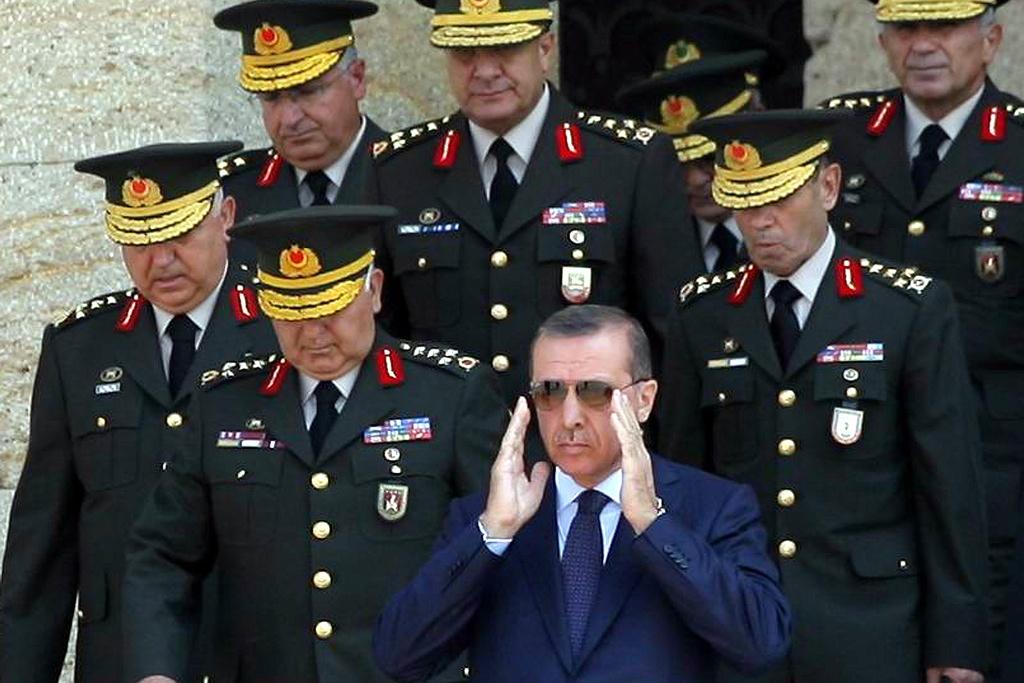Has Turkey taken an authoritarian turn?
Turkey’s Prime Minister Tayyip Erdogan is flanked by military commanders in Ankara on Aug. 1, 2011.
ISTANBUL – Fifty years ago challenging the Turkish military came at a heavy price – as the democratically elected Prime Minister Adnan Menderes learned in 1960 when the first in a series of military coups left him and two others hanging from the gallows.
But times change, and the tools left in the arsenal of the once-omnipotent Turkish military are looking increasingly feeble. Although most regard the military's diminished power as a positive new reality for Turkey, some worry that it has come about at the hands of a civilian government that is looking increasingly “authoritarian.”
Last week Turkey’s top commander, along with heads of the navy, army and air force, quit to protest the detention of some 250 comrades facing charges of planning a coup. These kinds of cases (and there are several ongoing) have provided the judiciary with the ammunition for relentless attacks on the top ranks of the military.
More from GlobalPost in Istanbul: The politics of facial hair
In a bitter farewell speech, the outgoing chief of the military, General Staff Isik Kosaner, said that it had become “impossible to continue serving” due to the ongoing detentions. Just hours before the resignations, courts indicted 22 more officers for setting up anti-government propaganda websites.
But while Kosaner’s move was unprecedented, to some it was more a death rattle than a resounding blow to the government.
“This idea that the military can act above the law, this is not how a normal democracy works,” said Cengiz Aktar, a political scientist at Istanbul's Bahcesehir University.
Since the republic was founded in 1923, Turkey’s armed forces — who have long regarded themselves as the guardians of the secular state — have forced the government to step down four times. By reversing the trend the generals seem to have confirmed for many their own dwindling influence.
Mustafa Akyol, a journalist and author of Islam Without Extremes, calls the resignations “a landmark in a long process” of bringing the military into a space of accountability.
“Finally, we are seeing an implicit declaration that the civilian authority has the upper hand over the military.”
Turkish Prime Minister Recep Tayip Erdogan has not wasted time consolidating his control. General Necdet Ozel, the commander of the military police, was quickly made acting chief of general staff, and is expected to be confirmed as the overall commander on Thursday. Meanwhile, a four-day meeting of the Supreme Military Council to decide on promotions for the armed forces began as scheduled on Monday — despite the fact that five of the 14 seats reserved for the generals were empty.
The missing fifth general is key. He is one of more than 40 serving generals — almost a tenth of the country’s commanders — imprisoned on charges critics say are unconvincing.
More from GlobalPost: Is Istanbul too rich for the poor?
“Following these cases is like picking up a very old document,” said Gareth Jenkins, a security analyst who has written extensively about the ongoing coup investigations. “They just crumble in your fingers.”
Jenkins argues that the investigations are being used to muzzle opposition to the government and weaken the military. Those indicted are accused of being members in a clandestine terrorist organization, but the case has been criticized for it’s use of indiscriminate wire-tapping, it’s heavy reliance on secret witnesses, and the fact that several of the suspects have been held in detention for extended periods of time without charge.
“The military has long been a paper tiger,” said Jenkins, who sees the ongoing cases as proof of a shift from military to civilian authoritarianism engineered by Erdogan, who has governed since 2003.
“This is what we should really be worried about.”
Others, like Aktar, see the trials as a necessary step in the process of strengthening civilian oversight.
“Rather than authoritarianism, I prefer to say authority,” he said. “The authority of elected officials over military bureaucracy.”
Now in his third term, Erdogan has overseen remarkable changes in Turkey. The economy, while still dogged by unemployment, is thriving. An emboldened foreign policy has strengthened ties with the east and made the prime minister a darling on the Arab streets. He is poised to push forward with plans for a new constitution.
“Turkey cannot proceed with a constitution that was written under extraordinary conditions when Turkish democracy was suspended,” he said in a televised address the day after the generals resigned, referring to the army-dictated charter that came out of the 1980 coup.
GlobalPost in Tel Aviv: Israel's citizenry blows a collective fuse
But such transformation is not without its critics. Erdogan holds onto power tightly, even within his own party. Part of his plan to rewrite the constitution would provide for a strong French-style presidency that most agree he sees himself inhabiting. He has little tolerance for criticism.
But for Akyol, the changing power dynamics are not only inevitable but also deeply necessary to strengthen Turkey’s democracy — however imperfectly they may be being implemented.
“If people are concerned about the power of the [ruling party] why don’t they form better opposition parties?” he asked. “They’re trying to now, and we may owe that to the fact that the military is being forced out of the picture."
